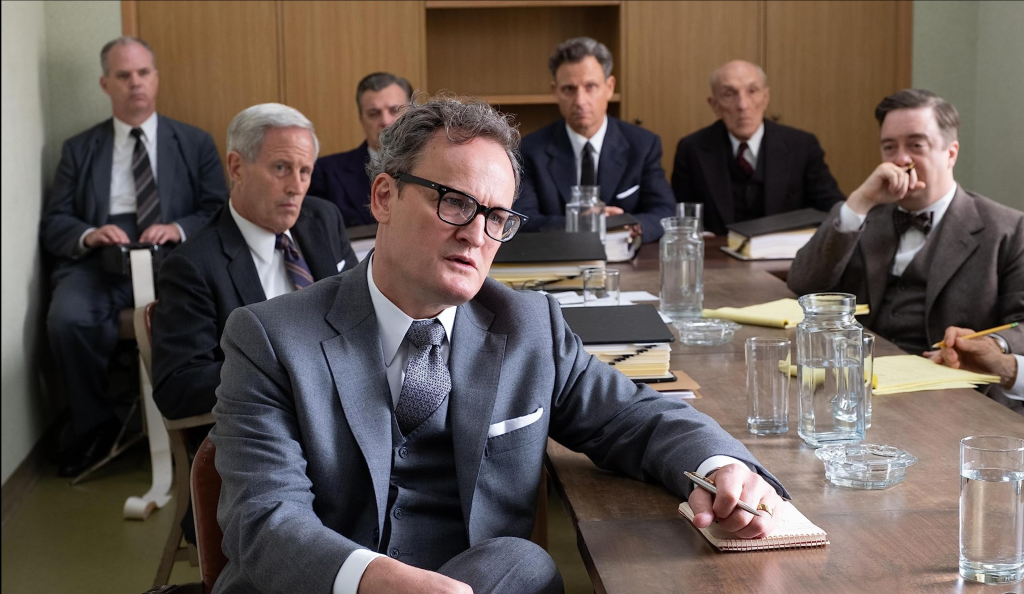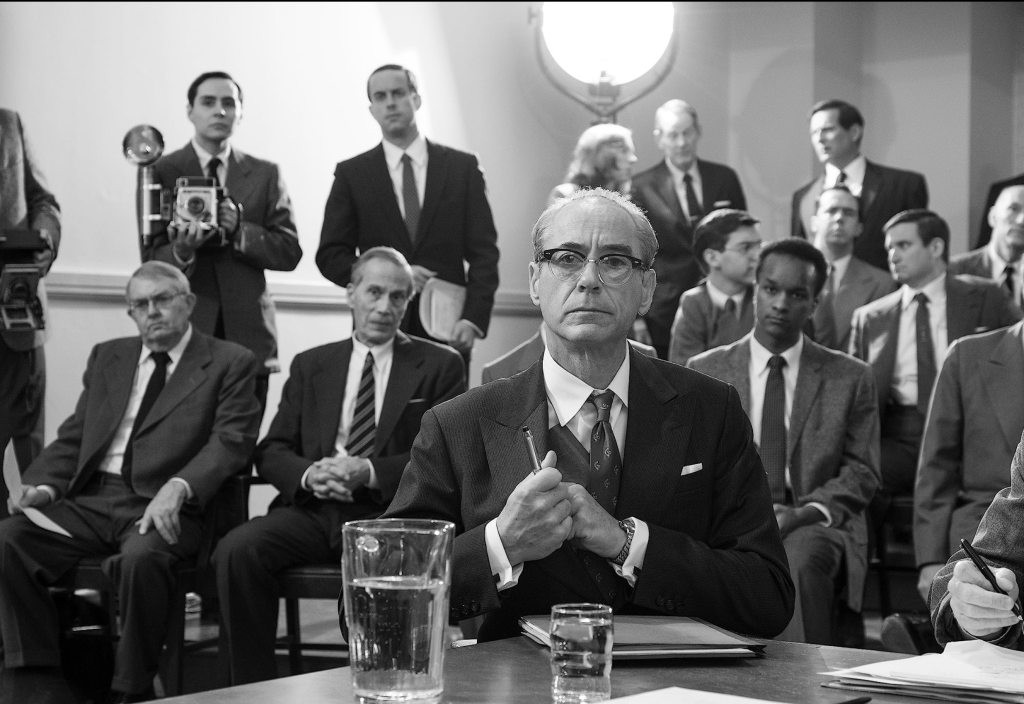Co- Editor-in-Chief Zheyuan Tony Yang reviews Christopher Nolan’s Oppenheimer, an epic thriller that delves into the life and mind of the “father of the atomic bomb.”
Christopher Nolan’s Oppenheimer is based on a book titled American Prometheus, a moniker physicist Niels Bohr places upon the titular character. Over the course of the film, he gains around half a dozen more titles, ranging from grand and ostentatious (“The great improviser”) to intimate and understated. (“Oppy”) They reflect the multitude of personas constructed around this man, by his colleagues and detractors, his enemies and confidants. But Nolan proves to be less interested in unpacking each of these identities than he is understanding the sum of their parts: For all its efforts at cinematic myth-making, Oppenheimer is ultimately about the man.
That man is J. Robert Oppenheimer, the theoretical physicist whose work as director of the Los Alamos laboratory under the Manhattan Project was instrumental in the birth of nuclear weapons, and for which he is remembered as “the father of the bomb.” But that brings us back to titles again. The film opens in the mid-1920s, as we see graduate student Oppenheimer (Cillian Murphy, who takes up every inch of film he appears in) stare out of the window of his dreary lab at a puddle formed in the pavement, every new drop of rain making ripples and bringing it closer to welling. Immediately we are in Oppenheimer’s head, as flashes of light and fire flicker on the screen, accompanied by fragments of sound that overwhelm the senses. These wooshes and clicks, mixed to take priority over any dialogue happening in the outside world, are brief glimpses into a vision of the universe that looms large over the young scientists’ imagination: It is one of chain reactions, of barrelling towards entropy without stop. It’s an abstract, theoretical way of examining physics, so we are told by Niels Bohr (Kenneth Branagh) during Oppenheimer’s fateful encounter with him at Cambridge, which brings Robert onto a trajectory to Germany before returning to the US. The film tries its best to let the audience in on this understanding with its deliberately jarring edits, foregoing the often times jargon-heavy approach of previous Nolan films like Interstellar and Tenet, instead using visual metaphors and allusions to classics of the early 20th century like T.S. Elliott’s The Waste Land to establish this sense of uncertainty and possibility: Oppenheimer is thinking beyond the space he occupies, and the whole discipline is about to change for it.

While it’s immediately apparent that the film has no interest in telling an “objective” story in the way many biopics purport to, it is the introduction of another element that makes the film slide comfortably into Nolan’s catalogue: Parallel storylines separated in time, unravelled in an order that allows for maximum dramatic effect. Suddenly it’s the 1950s, and Oppenheimer is sitting in a closed meeting chamber, Murphy’s eyes showing a mixture of indifference and despair. Across from him sits a board representing the United States Atomic Energy Commission (AEC), headed by judge Roger Robb (a weaselly Jason Clarke). They are weeks deep into grilling Oppenheimer over the matter of whether he should be allowed to retain his security clearance, as the red-scare era has brought his left-leaning beliefs and previous actions into question. As the board speculates on where Oppenheimer’s loyalties lie, a flurry of names and dates are brought up in quick succession, many of which unfortunately don’t become easier to keep track of as the film progresses.
And then Oppenheimer is out of the picture completely, as we are whisked into the 1960s and the chambers of congress. Former AEC chair Lewis Strauss (played by Robert Downey Jr. with incredible precision and surprising pathos) walks into the chambers of congress for a confirmation hearing regarding his potential appointment as Secretary of Commerce. In contrast to the soft, mellow lighting deployed when depicting Oppenheimer’s past, or the dampened hues used to heighten the intensity of the security hearings, here cinematographer Hoyte van Hoytema switches to a sharp black and white, highlighting the lines etched into Strauss’s face. Strauss, whose opinion on Oppenheimer soured after a shaky first meeting, fashions himself the Salieri to Robert’s Mozart, a man with enough insight to stay in Oppenheimer’s orbit, yet remains utterly eclipsed by him. But at this moment, a few formalities away from the seat of power, the camera seems to lock in Strauss’s victory as a fact of history.

Yet, this black and white view proves to be deceptive, which is perhaps Nolan’s entire point. Unlike Inception or The Prestige, there really is nothing to spoil here. As much as the film plays with chronology, it takes no major liberties with history, and over its lengthy 3 hours nearly every notable point of Oppenheimer’s life across 4 decades is covered. The film still contains its fair share of revelations, but they are rooted not in the plot but in the characters. Each and every one of them —— and the size of this fantastic ensemble cast makes it hard to count —— appears extremely prescient of the moment in history they occupy. This is undoubtedly Nolan’s talkiest work, and much of what is exchanged during these debates and roundtable discussions are about rooting Oppenheimer’s actions in the present: Matt Damon’s general Leslie Groves approaches Robert at the outset of US involvement in WW2, giving a weighty if begrudging plea on the importance of his aiding the war effort; while a postwar debate involving various AEC members (Josh Hartnett, Matthew Modine, etc.) features many of them advocating for the development of a hydrogen bomb in response to a looming Soviet threat. They all seem to be entirely reactionary, appointing Oppenheimer to strategic positions of national defence on the same whim that leads them to turn against him.
Oppenheimer, on the other hand, is consistently presented as a visionary: His ideological and romantic involvement with Communist party member Jean Tatlock (Florence Pugh, making the most of a minor role) stems from his ability to see the tides of revolution outside of science, while his disagreements with wife Kitty (Emily Blunt) to acknowledge the loaded questions and inflammatory rhetoric of the AEC board seem driven by a prophetic understanding of his ultimate political rehabilitation. Yet such foresight haunts him at every turn, as his acts of panic and courage alike transform into ammunition for his enemies, which grows to include his own consciousness as the film progresses.
Even the Trinity test sequence, in its terrifying beauty and breathtaking magnitude, is understood primarily through the ruinous effects it has on its inventor’s soul. The clearest demonstration of the film’s priorities is in a scene where Oppenheimer hallucinates the effect of a nuclear explosion, and its searing intensity exceeds that of the actual detonation. In his pursuit of becoming the American Prometheus, Robert has instead become the American Frankenstein: a man whose gravest misfortune was having to bear witness to the age he created. What is his legacy? Oppenheimer never quite finds his answer, and Oppenheimer the film doesn’t either. It merely presents its case— a masterfully crafted, densely plotted testimony— and lets us be the judges.
Oppenheimer arrives in UK Cinemas on July 21st. Watch the official trailer for the film here:




